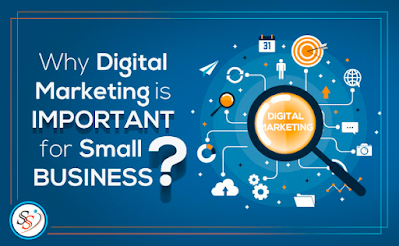Digital Marketing for Small Businesses : How to Market Your Products and Services Online
Digital Marketing for Small Businesses : How to Market Your Products and Services Online
In today's fast-paced and digitally driven world, the success of small businesses hinges on their ability to adapt and thrive in the online realm. Digital marketing has emerged as a powerful tool, providing small businesses with unparalleled opportunities for growth, visibility, and customer engagement.
In this article, we will delve into the critical importance of digital marketing for small businesses and how it can be a game-changer in today's competitive landscape.
1. Leveling the Playing Field
One of the most significant advantages of digital marketing is its ability to level the playing field. Small businesses often face resource constraints compared to larger competitors with more substantial budgets. However, the digital landscape offers cost-effective marketing channels that allow small businesses to compete on a more equal footing. Through smart digital marketing strategies, small businesses can effectively reach their target audience without the need for massive budgets.
2. Cost-Effective Reach
Traditional marketing methods such as print ads or television commercials can be expensive and may not provide the desired ROI for small businesses. Digital marketing, on the other hand, offers a range of affordable options. For instance, pay-per-click (PPC) advertising allows businesses to set precise budgets and pay only when someone interacts with their ads. Social media platforms offer cost-effective ways to reach a highly targeted audience through sponsored posts and ads.
3. Precision Targeting
Digital marketing allows for precise audience targeting. Small businesses can define their ideal customer personas based on demographics, interests, behaviors, and other factors. This granular targeting ensures that marketing efforts are directed at those most likely to become customers. As a result, resources are utilized efficiently, and marketing messages resonate with the right audience.
4. Data-Driven Insights
Digital marketing provides small businesses with invaluable data and insights. Analytics tools track website traffic, user behavior, email open rates, conversion rates, and more. This data-driven approach enables businesses to measure the effectiveness of their marketing campaigns in real-time. Small businesses can make informed decisions, adjust strategies, and optimize their marketing efforts based on concrete data.
5. Enhanced Customer Engagement
Engaging with customers is vital for building brand loyalty and trust. Digital marketing offers numerous avenues for meaningful interactions. Social media platforms enable two-way communication, allowing businesses to respond to inquiries, address concerns, and create a sense of community. Email marketing keeps customers informed and engaged with personalized content and offers.
6. Global Reach
With the internet's global reach, small businesses can expand their customer base beyond local boundaries. Through e-commerce platforms and online marketplaces, products and services can reach a global audience. Digital marketing strategies such as search engine optimization (SEO) and content marketing help businesses establish an international presence.
7. Measurable Results
Unlike traditional marketing methods, where measuring ROI can be challenging, digital marketing provides precise metrics. Businesses can track the performance of each marketing campaign, allowing for continuous improvement and optimization. This transparency ensures that every marketing dollar is well-spent and contributes to business growth.
In an increasingly digital world, embracing digital marketing is not just an option for small businesses; it's a necessity. It empowers small businesses to compete effectively, reach a global audience, engage with customers, and measure results with unprecedented precision. Small businesses that harness the power of digital marketing gain a distinct advantage in today's competitive landscape, enabling them to thrive and achieve remarkable growth.
Digital Marketing for Small Businesses : How to Market Your Products and Services Online
B. The Evolution of Digital Marketing C. Why Digital Marketing Matters for Small Businesses D. Key Digital Marketing Trends
2: Building a Mobile-Friendly Website
A. The Importance of a Mobile-Responsive Website B. Website Design Best Practices C. User Experience (UX) and Navigation D. Website Speed and Performance
3: Search Engine Optimization (SEO)
A. Understanding SEO Fundamentals B. On-Page and Off-Page SEO Techniques C. Local SEO for Small Businesses D. Measuring and Tracking SEO Success
4: Pay-Per-Click Advertising (PPC)
A. Introduction to PPC Advertising B. Setting Up PPC Campaigns C. Keyword Research and Selection D. Creating Effective Ad Copies E. Monitoring and Optimizing PPC Campaigns
5: Social Media Marketing
A. Leveraging Social Media Platforms B. Developing a Social Media Strategy C. Content Creation and Scheduling D. Engaging with Your Audience E. Analyzing Social Media Metrics
6: Content Marketing
A. The Power of Content Marketing B. Creating Valuable and Engaging Content C. Content Distribution Strategies D. Measuring Content Marketing ROI
7: Email Marketing
A. Building an Email List B. Crafting Effective Email Campaigns C. Automation and Personalization D. Email Marketing Analytics and Optimization
8: Online Advertising and Display Ads
A. Types of Online Advertising B. Display Advertising Strategies C. Banner Ads and Remarketing D. Measuring Advertising ROI
Additional Resources
A. Resources, Tools, and Templates B. Glossary of Digital Marketing Terms C. Index

Comments
Post a Comment